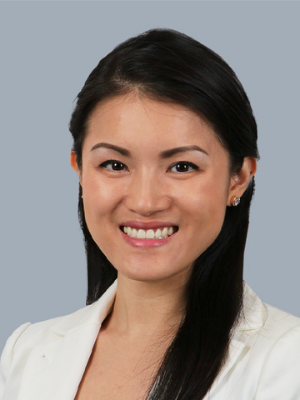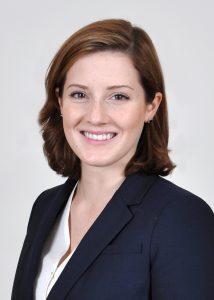 “The truth is, if I can be loving and patient, and approach whatever comes my way with compassion, everything will fall into place,” says Jingjing (JJ) Liang. “Being a good lawyer, a good colleague, a good mother, a good partner, a good daughter – it all starts with being a loving person. Approaching things with a loving attitude will make things easier for you.”
“The truth is, if I can be loving and patient, and approach whatever comes my way with compassion, everything will fall into place,” says Jingjing (JJ) Liang. “Being a good lawyer, a good colleague, a good mother, a good partner, a good daughter – it all starts with being a loving person. Approaching things with a loving attitude will make things easier for you.”
Liang speaks about staying open-minded, building your confidence, using your voice and showing up to the moment.
Be Open to Surprise
“Keep an open mind,” Liang advises law students. She never would have seen herself in law, let alone as a specialist in compensation and governance – yet there are advantages to unforeseen changes.
Having specialized in European history in her undergraduate studies at the University of Toronto, Liang became interested in legal history while studying in Europe. She took her mother’s insightful advice to work as a paralegal before investing in law school. After working for a year as a legal intern in Beijing, China and another year as a legal assistant in Toronto, Canada, she headed to the University of Texas School of Law. During her summer associate program at Shearman & Sterling in New York, where she rotated through the firm’s M&A and litigation practice groups, she received an offer to join the compensation and governance group.
“At that time, I thought, I have no idea what this is, this is so specialized, I just want to do M&A,” confesses Liang. “My work was very tough in the beginning as a first-year associate, because there were nothing from which I could draw on from my law school studies. The learning curve was steep.”
It was only when Liang found herself teaching summer associates that she realized how quickly she had grown and how much she enjoyed the work. Relative to her peers in other practices, Liang found she was not just reviewing and proofreading documents as a junior associate, but actually providing substantive legal advice and engaging directly with clients. “I’m glad I kept an open mind to try out this practice, I never would have known how well-suited it was for me if I hadn’t.”
How You Approach The Moment Is the Practice
Being patient, flexible and quick on her feet has served Liang well, but her ability to approach a situation and respond adeptly is her core practice.
When an urgent request comes in the night before an early meeting, it’s easy to stress. But Liang draws on her work as a meditation and yoga instructor: “The person in front of me and the request is not by definition stressful. It could be stressful to me, but interesting or fun to somebody else,” she observes. “So if the stress is coming from me, then I have the ability to change it. That’s how I try to approach difficult moments. I try to ask, ‘how can I ease the situation so it becomes easier for everyone involved.’”
Early on, Liang received two valuable insights into the enigma of work-life balance in Big Law: “It can be pretty impossible to strive for ‘work-life balance’ on a daily basis, so if you focus on balance in the ‘tree’ of a day, it can feel like a fight. But if you can step back and observe the wave of activities that come and go throughout a month or couple of months, you can take in the ‘forest’ and find more balance.”
Liang recommends that junior lawyers make plans with families and friends and surround themselves with people who will understand when something comes up. Even if you need to cancel a weekend plan, it’s important to still create the room to nurture your personal and social life.
Building and Bringing Confidence
As she becomes more senior, Liang’s advice to her younger self would be to take time and dig into the topics in your field you’re deeply interested in. “What did I enjoy most in this deal and what can I do next to strengthen the skills I gained today?” She recommends stepping back after big deals or intense periods of work to reflect on the learning experience to deepen career development.
“You’re learning so many different topics over time and quickly, it would be worthwhile to categorize your specialties so you can reinforce each one, becoming aware of your strengths and weaknesses in the substantive aspects of law,” says Liang. “I think it’s important to build confidence in your knowledge base, and that’s hard to do when it’s go-go-go.”
Reflecting on how her generation is changing the legal field, she feels her peers in her generation are more likely to just sit at the table rather than waiting to be invited: “Even more, when we sit at the table, we’re not afraid to ask questions and contribute. We’re not afraid to give our view and participate in a discussion among more senior lawyers, ” she says, also noting her parents encouraged speaking up early on in life. “I’m not embarrassed to be wrong (of course, being thoughtful about my contribution is important too). I’m excited to have this conversation with everyone at the table.”
Liang recognizes that she stands on the shoulders of women who have paved the way, and for that, her generation of women tends to hesitate less: “Women lawyers at conferences are always talking about not having to stay quiet because you’re a woman, and I am thinking, I don’t think we’re being quiet.”
When it comes to being Asian American, at certain times in her journey, Liang has felt stereotyped, such as the expectation that she would be quiet, being asked where she’s really from, or being spoken to in some Asian language. These problems can be subtle and until she talks with Asian peers who have had similar experiences, it’s difficult to validate what’s happening in that moment. “It’s a difficult conversation,” she says, “but because discrimination, macro or micro, is still there, we’re still talking about it.”
She does not, however, feel she’s facing a “bamboo ceiling” in Big Law, and found it inspiring last year to witness two female Asian women appointed to partners at Shearman, including Lara Aryani. She also feels lucky to work closely with female partners at the firm who value the mentoring and sponsorship of young lawyers through open dialogue and active training on how to be successful in this industry.
An Ever More Compassionate Self
Certified by Three Jewels Enlightenment Studio, Liang became a meditation and yoga instructor. During the pandemic, she was able to establish a more regular meditation practice to help cope with work, the ever-changing state of the world, and more recently, being a new parent. To give back to her community, she currently teaches yoga on Sundays with Three Jewels.
One of Liang’s meditation practices is “Future Refuge” – where you envision your future and step into that version within your present self: “If I can envision all of these aspects of my future self, what’s stopping me from being that today? Even if I can’t change external conditions, how can I embody the characteristics of the ‘future me’ now?”
Engaging in her meditation and yoga practice regularly, she sees herself in five years as being even more calm, loving and compassionate. Going back to when a client asks her for an emergency request, in a difficult moment, she chooses to view the request as if it’s coming from her best friend who she would do anything for, even if it throws her evening plans awry.
She also loves being with her ten-month-old son, watching how he explores the world and looks forward to traveling the world with him in the future.
By Aimee Hansen


